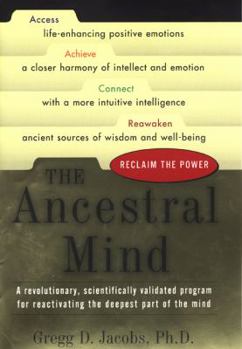The Ancestral Mind: Reclaim the Power
Select Format
Select Condition 
Book Overview
Dr. Gregg Jacobs suggests that while we are better off materially than any generation in history, we remain unhappy, frustrated, and stressed, in large part because we have neglected our emotional well-being. A significant cause of our current condition is our over-reliance on the Thinking Mind and our disconnection from the Ancestral Mind. The Thinking Mind-the rational, self-conscious mind-is responsible for our great technological achievements,...
Format:Hardcover
Language:English
ISBN:0670032174
ISBN13:9780670032174
Release Date:June 2003
Publisher:Viking Books
Length:242 Pages
Weight:1.18 lbs.
Dimensions:1.0" x 6.5" x 9.5"
Customer Reviews
3 ratings
Grounded in Science
Published by Thriftbooks.com User , 19 years ago
Gregg Jacobs is a Boston-based PhD Psychologist who worked extensively with Herbert Benson and has developed into one of the country's leading experts on sleeping disorders. As a graduate student he participated in extensive studies on the relaxation response, the effects of meditation, and sensory deprivation. His new book espouses a theory that human beings literally have two "minds" -- the "thinking mind" (author of our inner dialogue) grounded primarily in the neo-cortex, and the "ancestral mind," grounded primarily in the "reptilian" and "mammalian" portions of our brains. The author theorizes that the ancestral mind was instrumental in our evolutionary development as humans, and that it has been subsumed, especially since the development of language and writing, by our thinking mind. The author also explains the health issues related to the dominance of the thinking mind. Briefly oversimplified, reactions like the "fight or flight" response emanate from our ancestral mind, and were useful when danger was immediate and physical and required an immediate action response. Today, when the "threats" facing us are more likely to be financial than physical, more likely to involve traffic jams and demanding supervisors and computers and other machinery that breaks down, the "fight or flight" response is not easily discharged through action, as it once had been. The result, in combination with the inner dialogue of the thinking mind, turns fear of the immediate into generalized anxiety and helps to generate mental health issues like phobias and depression. What I appreciated about this book, more than anything else, is it's foundation in proper science. While the book helps to explain the efficacy of some new age practices, it does so from an empirical perspective. For tackling such a complex issue, the book is written in a clear and straight-forward manner. It also provides a number of practical suggestions for connecting with the ancestral mind that readers may find helpful.
Know Thyself Better
Published by Thriftbooks.com User , 21 years ago
Gregg Jacobs has written a book that really gets to the meat of the issue of how do we find meaning and happiness in our lives. This is the perfect blend of psychology and the science of evolution. Why are our brains hardwired they way they are? Jacob's has some of the answers. I like the fact that he includes some cognitive psychology with evolutionary reasons why we feel and act as we do. The main premise is that our ancestors developed their minds and emotional lives far differently than we do today because they were not burdened by the internal monologue of modern man, which is caused by depending on a verbal form of communication and reasoning which follows from the use of language as a form of communication.But there is hope for modern man he can learn to connect with the emotions and feelings that our early ancestors used to interact in their social settings, and if we use some of their methods we too can expand our understanding and interaction with ourselves and fellow beings. The result being a further connection to our environment and others in our lives, and ultimately a better life with meaning, purpose and fulfillment. A large order but much of the information give by Jacob's can help one see why they have problems connecting and freeing their minds of the seemingly endless burdens and fears of modern life.
Wonderful advice for Americans
Published by Thriftbooks.com User , 21 years ago
Since my wife and her family are Samoans, I've benefitted from their more natural, less technological cadence, a rhythm highly recommended by the author, who suggests that contemporary industrial man lives too much in the wordy, cerebral mind and too little in the emotional mid-brain that we share with other mammals. The book provides a wealth of practical exercises that help us tune out our constant analytical self-chatter and attune ourselves to simpler and emotionally wiser ways. He also describes the many health benefits of religious faith, available to believers. But there's the rub for many, because the Judeo-Christian scriptures that so many find comfort in have been so deconstructed by textual analysis as to render them too little believable in too many ways for too many people of intelligence, education and rational ability. But the author doesn't denigrate religion, and is honest in admitting that while it works well for many it doesn't for many others. I gave the book four stars rather than five because the author doesn't adequately resolve the issue of credibility of traditional religions in a scientific age.






